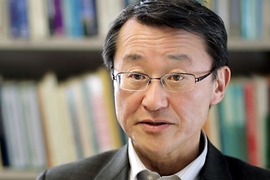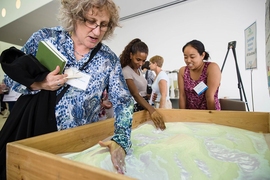The increasing popularity of massive open online courses (MOOCs) has created new pathways to education, connecting diverse groups of learners not bound by geography. But what happens when these online students engage and interact? Do they build bridges of healthy discourse or do they form siloes of insular thinking — and is it possible for instructors to forge communities founded on conversation rather than conflict?
Education researcher Justin Reich, executive director of the Teaching Systems Lab within MIT’s Office of Digital Learning, intends to find out. Reich, along with associates from Princeton University and Harvard University, was recently awarded a $400,000 research grant from the Spencer Foundation. The grant is part of the foundation’s “Measuring the Quality of Civic and Political Engagement” initiative.
“The purpose of the project is to evaluate how people with different political backgrounds and beliefs interact with each other in online courses that have a political tinge,” explains Reich. “Are these more siloed spaces or more bridging spaces? Are they more like echo chambers or places where people come together — and can we make them more like the latter?”
Reich’s study, “Computational Measures of Engagement Across Difference in Online Courses,” seeks to develop new metrics for instructors to evaluate how students engage in discussion forums. Researchers will collect highly granular data and perform a deep social network analysis — examining the connections between posts and replies in forum threads to determine the shape of interactions among people with diverse political beliefs. The team will then gauge the degree to which students in forums respond directly to those with differing opinions, versus forming separate conversational siloes with only like-minded students.
Researchers will also use text analysis to evaluate whether the use of language in online forums converges or diverges among students with dissimilar beliefs. After all, even if politically divergent students form a dialogue, they may still use siloed language to talk past one another.
This research opportunity comes at a pivotal moment. While online education has been available for decades, the scale of MOOC enrollment and adoption by elite universities has raised both public and institutional scrutiny. MOOCs generate a globally diverse online learning community, yet that diversity does not guarantee students will encounter and consider different perspectives. Reich hopes his research will shed light on the open classroom climate while paving a path for improvement.
“We predict that, in courses with high-quality discussions, students in diverse networks will communicate directly with each other using shared language,” Reich says. “If our computational measures prove to be useful indicators of high-quality discussion, then our research can point the way towards the development of instructor dashboards that provide real-time indicators of the civic health of online discussions.”
Reich also believes the research will both impact his work at the MIT Teaching Systems Lab and, ultimately, transcend the online classroom. “Great schools do more than prepare people for a career; they prepare students to live in a civil society and lead reflective, ethical lives,” he explains. “As we develop online learning environments, our tools, assessments, and instruments need to be as broad as our hopes for education. This project intends to bring the civic mission of schools into the focus of online learning research.”











